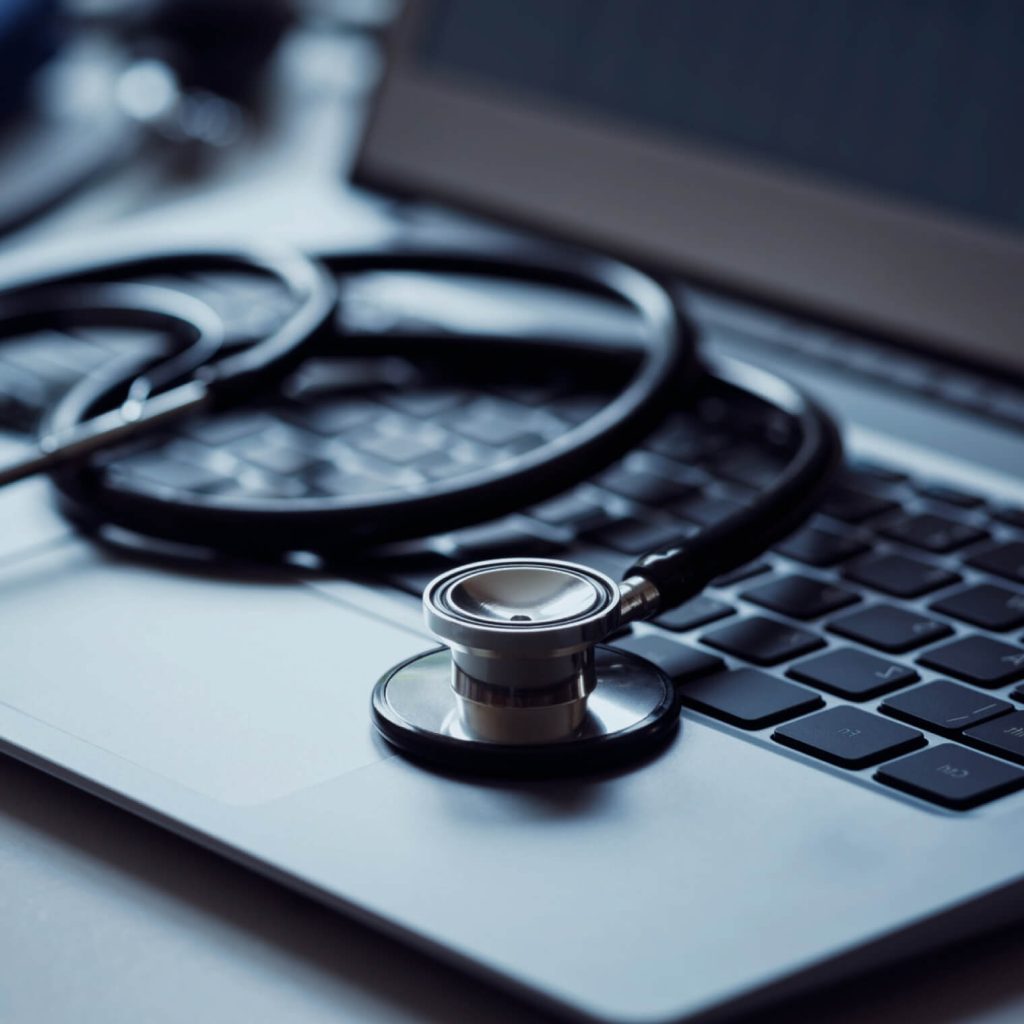Healthcare innovations have been growing at a dizzying speed over the last decade, particularly when it comes to patient records, analytics, and apps. However, these rapid advances in healthcare software development have opened the door to potential data breaches and other forms of unauthorised access to patients' sensitive data. Here’s what your organisation needs to know about data security for healthcare software, no matter how your business uses protected personal information in its operation.

-
Why Data Security Is Essential in Healthcare
Whether you manage a facility that provides direct clinical care or run an app that providers use to analyse patient information, you must ensure that certain data is shared only with permitted entities. Breaches in data security can actually be illegal (see below), resulting in citations, fines, and liability lawsuits in many nations.
At best, data theft or inappropriate sharing could cost your business in insurance claims, court judgments, or private settlements. It can cost millions in crisis management and reparations when a data breach occurs. At worst, a massive leak in data security could ruin your reputation or force the closure of your business.
Regulations Governing Health Information
Data security and privacy in healthcare is a serious concern globally. Statistics on system leaks and attacks are grim. Over 80 per cent of UK healthcare institutions had a ransomware attack in 2021. National Health Service foundation breaches are common across the country. One of the largest healthcare breaches of all time occurred in the United States in 2021, affecting 3.5 million individuals.
This is in spite of government attempts to regulate healthcare security and protected health information (PHI) through a variety of national laws and local regulations. These laws control most aspects of healthcare software use pertaining to secure data storage and transmission. Some of the data protection requirements you may encounter in your business include:
- Data Protection Act in the UK
- Health Insurance Portability and Accountability Act (HIPAA) in the US
- Personal Information Protection and Electronic Documents Act (PIPEDA) in Canada
- General Data Protection Regulations (GDPR) in the European Union and some non-EU European nations
- Privacy Act in Australia
- CyberSecurity Law in China
- Personal Data Protection Act in Taiwan
- Personal Information Protection Act in South Korea
- Digital Information Security in Healthcare Act in India
Which Types of Healthcare Software Require Data Security?
There are numerous types of software used in healthcare that are required by law to have data security, depending on where you operate and where patients are using the software. This list is not exhaustive but includes:
- Active inpatient and outpatient charts and medical records
- Medical records storage
- Healthcare institution database systems
- Apps that provide remote clinical assistance to patients
- Healthcare appointment scheduling apps and website forms
- Telehealth apps for mobile patient care
- Patient tracking apps
- Apps or networks for practitioner referrals and consultations
When in doubt, it’s always best to refer to your local laws regarding healthcare data security to determine if your business is subject to protected health information regulations.
What Kinds of Protected Health Information Are at Risk?
Unfortunately, there is a large global demand for patient health information. It’s used for identity theft, financial theft, ransomware extortion, fraud, scams, stalking, and personal blackmail, amongst other nefarious purposes. In some instances, patient details aren’t taken to commit crimes but may inadvertently fall into the wrong hands, leaving the patients’ privacy breached.
Most commonly, the data in question includes:
- Emergency ward visits
- Hospitalisation records
- Outpatient treatments
- Appointment calendars
- Ongoing medical conditions
- Specialist referrals
- Test and laboratory results
- Genetic information
- Prescriptions for medications
- Identifying data (National Insurance Number, Social Security Number, fingerprints, biometrics, photographs, etc.)
- Financial information (bank and credit card numbers)
- Personal information (phone numbers, addresses, family names, passwords, etc.)
- Patient demographics
How Do the Wrong Parties Acquire PHI?
In order to secure what should be protected patient information, it’s important to understand how data is stolen or accidentally leaked in the first place. Multiple factors have contributed to the rise in data breaches recently:
- Increase in telehealth following the coronavirus pandemic
- Uptick in patients accessing healthcare from abroad
- Growth of artificial intelligence and big data in healthcare
- Use of cloud computing without appropriate safeguards
- Reliance on third-party apps and services
Other reasons patient data is compromised include:
- Outdated systems and technology
- Lack of protection in electronic health record (EHR) transfer
- User error or carelessness (e.g., staying logged in on a system when busy rather than logging out between patients)
The last three points are particular sore spots, as healthcare systems have become overwhelmed since the pandemic. They’ve suffered the loss of experienced employees, an abundance of minimally trained novice care providers, general worker shortages, and impossibly tightened budgets.

How Healthcare Businesses Can Protect Their Data
Just because there are many opportunities for security losses seemingly inherent in healthcare doesn’t mean you should abandon attempts to provide the best data security possible with your software. Follow these tips to improve the safety of the information you work with.
Understand whose regulations you must follow
Compliance with HIPAA and other regulations like GDPR and the Data Protection Act is essential, but you need to know which regulations govern your software usage. You may be based in the UK, but if you have patients in the US, for instance, you must make sure you’re covered for both the Data Protection Act and HIPAA.
Use two or more validation methods for sign-in
Software should require, at a minimum, two-factor identification. This can involve a PIN code, biometrics, security questions, or a code sent to an email address or texted to a mobile phone.
Clean and archive data to minimise what you are storing
You reduce the volume of potential risk by getting rid of or storing data you don’t need. Data wiping has the added benefit of freeing up storage to reduce storage expenses.
Back up data routinely
Only you know how often your business should back up data — it might be once per week, or it might be multiple times per day. Backing up information to a remote location not only protects patients or app users but it can also be a lifeline if your premises experience a disaster. If you store large amounts of data, consider splitting storage between several locations in case one is compromised.
Utilise SSL technology
Secure Sockets Layer (SSL) protocols grant access to data to only certain authorised employees. This can reduce accidental or intentional human errors and data theft.
Encrypt data in compliance with regulations
Data should be encrypted for both storage and transmission, such as sending a medical record between facilities. Your national and/or regional laws dictate the specifics of this.
Keep systems updated
This mostly applies to healthcare institutions rather than app builders. If it’s tough to get necessary upgrades through the C-suite, emphasise the cost of a breach, which could be much more than the expense of hardware and software updates.
Test software regularly and fix bugs immediately
Audit your software frequently to look for problems. Any issues discovered through healthcare software testing and validation must be fixed straight away, not put on the back burner to be addressed in the future.
Train employees thoroughly
You can use all the anti-malware software and password protections you like, but if staff aren’t well trained, they may become a liability. Computers shouldn’t be left open when not in use, and workers should be taught to spot phishing attempts, email scams, and the like.
Educate patients
Likewise, patients must understand that they also play a role in their data’s security. Using private internet, not sharing passwords and other simple methods can reduce data theft on their end. They should also understand your privacy policies and sign off on them.
Have a security and incident response plan in place
Especially if you are a large business or healthcare institution, you should have a protocol to hand should there be an incident in spite of taking great care with your data security. Run a tabletop drill to see how various scenarios might play out and be managed.

Consider custom software solutions
If all of the above feels beyond the scope of your business, or if you need specialised security measures not available in out-of-the-box software, you should think seriously about customised healthcare software. Custom software development offers many benefits:
- Improved patient service
- Greater cost-effectiveness
- Automation to reduce errors and reallocate manpower
- Better opportunities for data analysis
- Ability to streamline data to meet deliverables
- Reduced vulnerabilities associated with leakage and loss
To learn more about how the team at ELEKS can partner with your business for better patient care and improved data security simultaneously through a custom software solution, reach out today.
Related Insights















